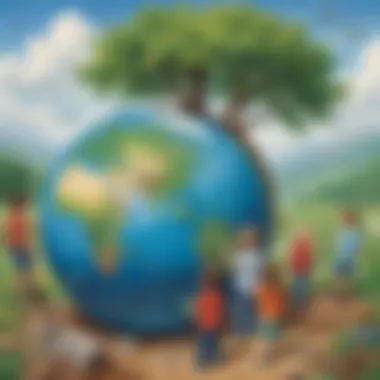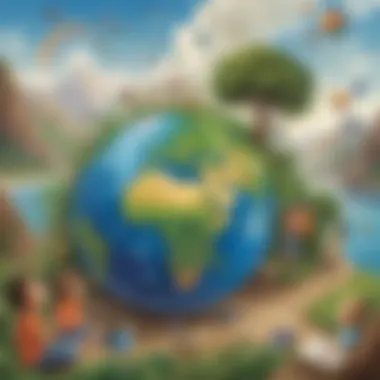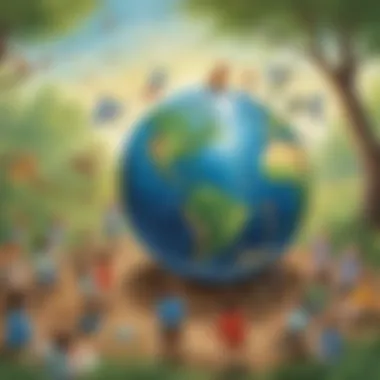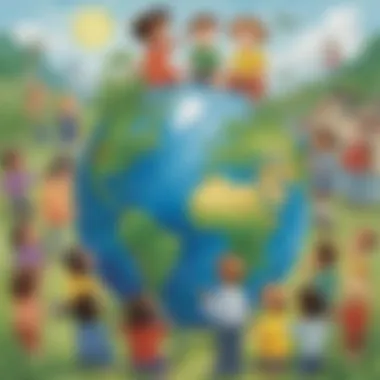Engage Preschoolers with Exciting Earth Day Lessons for a Greener Tomorrow


Science Fun Facts
It's fascinating to discover some quirky science stories and delve into amazing science records that spark curiosity and evoke thought-provoking questions in young minds. For instance, did you know that the Earth is the only planet known to support life due to its unique balance of temperature, water, and atmosphere? This fact alone can make preschoolers ponder the wonders of our planet and their role in protecting it.
Discover the Wonders of Science
Explore various scientific concepts such as the water cycle, carbon footprint, and pollution through engaging videos and animations tailored for preschoolers. Utilize interactive learning tools to demonstrate real-life applications of science in a way that captivates young learners and instills a sense of wonder about the world around them.
Science Quiz Time
Engage preschoolers with interactive quizzes filled with multiple-choice questions, brain teasers, and puzzles that make learning about the environment and sustainability fun and engaging. Incorporate gamification elements to enhance the learning experience and ensure that children are actively participating in the educational activities.
Science Experiment Showcase
Dive into fun and engaging experiments like creating a mini compost bin, observing plant growth, or crafting recycled paper with step-by-step instructions catered to preschoolers. Provide a detailed materials list to make it easy for parents and caregivers to gather supplies, along with essential safety tips and precautions to ensure a safe and enjoyable hands-on learning experience for young children.
The significance of Earth Day spans beyond a mere celebration; it serves as a cornerstone for instilling environmental consciousness in young minds. With the world facing escalating environmental challenges, introducing preschoolers to the ethos of Earth Day becomes paramount. This article aims to elucidate the critical role of Earth Day in shaping the environmental attitudes of the future generation. By embracing engaging preschool lessons centered around Earth Day, we sow the seeds of environmental awareness and responsibility, ensuring a sustainable future for our planet.
Earth Day stands as a symbolic reminder of our collective duty to protect and preserve Earth's natural resources for generations to come. This day offers a platform to foster a connection between preschoolers and the natural world, cultivating empathy and respect for the environment. Through interactive and creative activities, children can develop a profound appreciation for the Earth's beauty and diversity while understanding the importance of conservation efforts. Thus, the Introduction section of this article sets the stage for a holistic exploration of Earth Day-inspired lessons that blend education with enjoyment, nurturing a generation of environmentally conscious individuals.
As we delve into the heart of Earth Day's significance, we uncover a wealth of opportunities to engage young learners in sustainable practices. From honing recycling skills through 'Reduce, Reuse, Recycle' mantras to exploring innovative composting techniques, preschoolers can grasp the importance of waste management and resource conservation. This section will delve into the practical applications of eco-friendly practices, illuminating how these small yet impactful actions contribute to a greener, more sustainable planet.
Stay tuned for an enriching journey through Earth Day exploration, where children will discover the wonders of nature, imbibe hands-on gardening experiences, unleash their creativity with recycled art projects, and engage in sensory play that stimulates their understanding of environmental concepts. Through a harmonious blend of education and entertainment, preschoolers will embark on a transformative learning voyage that nurtures their love for Earth and fosters a deep-rooted sense of environmental stewardship.


The Significance of Earth Day
Earth Day holds immense significance in our modern world as we strive towards environmental sustainability and a healthier planet for future generations. This annual event serves as a poignant reminder of the crucial importance of preserving our natural resources, reducing pollution, and embracing eco-friendly practices. For preschoolers, understanding the essence of Earth Day fosters a deep appreciation for the environment, instilling values of conservation and stewardship at a young age.
As we delve into the significance of Earth Day within the context of this article, it is essential to underscore the educational opportunities it presents for young learners. By introducing children to the concept of Earth Day, we equip them with the knowledge and awareness necessary to become responsible global citizens. This section aims to illuminate the fundamental principles behind Earth Day and convey its relevance in cultivating empathy towards nature and promoting sustainable behavior.
Furthermore, Earth Day serves as a platform for engaging preschoolers in interactive activities that not only educate but also inspire them to make a positive impact on the world around them. Through hands-on experiences, such as nature walks, recycling initiatives, and creative projects, children can develop a profound connection with the environment and comprehend the significance of their actions in contributing to a greener planet. This section will explore how Earth Day activities can shape young minds, nurturing a sense of environmental stewardship and empowering them to become advocates for sustainability.
In essence, The Significance of Earth Day lies in its ability to sow the seeds of environmental consciousness in the minds of the youngest members of our society. By recognizing and appreciating the value of Earth Day, preschoolers can embark on a journey of discovery and learning that will not only benefit the planet but also enrich their lives with a profound sense of purpose and responsibility.
Eco-Friendly Practices
In this segment, we delve deep into the significance of eco-friendly practices in the context of engaging preschool lessons for Earth Day. Eco-friendly practices are crucial for instilling environmental stewardship in young minds. By integrating concepts like reducing, reusing, and recycling into preschool activities, children develop a foundational understanding of sustainability and conservation. It is essential to emphasize the importance of these practices in minimizing waste, conserving resources, and protecting the planet's delicate ecosystems. By incorporating eco-friendly practices into early education, preschoolers learn valuable lessons about responsible consumption and the impact of their actions on the environment.
Reduce, Reuse, Recycle
The mantra of 'reduce, reuse, recycle' forms the bedrock of sustainable living and environmental consciousness. Teaching preschoolers about the significance of reducing consumption, reusing materials, and recycling waste is paramount in fostering a greener mindset. By encouraging children to minimize waste through conscious consumption choices, promoting creative reuse of items, and introducing recycling as a daily habit, preschool educators can instill lifelong eco-friendly behaviors. Through engaging and interactive activities centered around the principles of reducing, reusing, and recycling, young learners can internalize the importance of environmental conservation and resource stewardship.
Composting Techniques
Composting techniques offer a hands-on approach to understanding the natural cycle of decomposition and soil enrichment. Preschoolers can explore the magic of composting by learning how organic waste transforms into nutrient-rich soil for plants. Initiating composting activities not only teaches children about resource recycling and reducing landfill waste but also fosters a deeper connection to nature's cycles. By incorporating composting techniques into Earth Day lessons, educators can empower preschoolers to become conscious global citizens who appreciate the value of organic waste management and environmental sustainability.
Connecting with Nature


In this section, we will delve into the importance of connecting with nature in the context of Earth Day preschool activities. Connecting with nature is a pivotal aspect of environmental education for young learners as it fosters a profound appreciation for the natural world. By engaging in outdoor experiences, children can develop a sensory connection to the environment, enhancing their understanding and compassion towards Earth's ecological systems.
Furthermore, connecting with nature offers a range of benefits, including physical exercise, cognitive stimulation, and emotional well-being. Through direct interaction with the environment, preschoolers can develop their motor skills, observational abilities, and creativity. This hands-on approach also encourages a sense of curiosity and exploration, sparking a lifelong interest in environmental conservation.
When considering activities that involve connecting with nature, it is essential to prioritize safety and supervision. Ensuring that children have access to age-appropriate equipment and are accompanied by responsible adults is crucial in facilitating a positive and secure outdoor experience. Additionally, educators and caregivers should emphasize the conservation of natural spaces and the respectful interaction with flora and fauna.
Outdoor Exploration
Outdoor exploration forms a fundamental component of connecting with nature during Earth Day celebrations. This section focuses on the significance of outdoor activities in enhancing children's connection to the environment and promoting a sense of stewardship towards the Earth. By venturing outdoors, preschoolers can engage all their senses in experiencing the sights, sounds, textures, and scents of the natural world.
Outdoor exploration not only offers a dynamic learning environment but also encourages physical movement and active play. Through activities such as nature walks, scavenger hunts, and wildlife observations, children can develop a holistic understanding of biodiversity and ecosystem interdependencies. These experiences not only foster a love for nature but also instill a sense of responsibility in caring for the planet.
When planning outdoor exploration activities, it is essential to consider weather conditions, terrain safety, and emergency protocols. Educators and caregivers should conduct thorough risk assessments and provide appropriate supervision to ensure the well-being of all participants. Incorporating elements of environmental education and sustainability practices into outdoor explorations can enrich the learning experience and encourage a deeper connection to the natural world.
Planting and Gardening
Another integral aspect of connecting with nature on Earth Day is through planting and gardening activities. Planting seeds, tending to plants, and observing growth cycles can provide preschoolers with hands-on experiences in nurturing life and understanding the importance of biodiversity. Gardening activities not only promote environmental awareness but also contribute to the development of patience, responsibility, and teamwork among young learners.
Engaging children in planting and gardening fosters a sense of ownership and pride in caring for living organisms, instilling values of respect and empathy towards nature. Through activities such as seed planting, watering routines, and garden maintenance, preschoolers can witness the tangible impact of their actions on plant growth and ecosystem sustainability. These experiences lay a foundation for ecological literacy and environmental stewardship, shaping children into conscientious custodians of the Earth.
When introducing planting and gardening activities, educators should provide age-appropriate gardening tools, materials, and guidance on plant care. Teaching children about the importance of water conservation, soil health, and plant life cycles can enhance their understanding of ecological processes and inspire a sense of environmental responsibility. By integrating planting and gardening activities into Earth Day curriculum, educators can nurture a deep connection between preschoolers and the natural environment, fostering a legacy of environmental stewardship and sustainability.
Creative Activities


Creative activities play a pivotal role in this article as they provide a hands-on approach for preschoolers to engage with Earth Day concepts. These activities stimulate imagination, promote critical thinking, and foster a deeper connection with nature. By incorporating creative tasks, children can express their understanding of environmental conservation in innovative ways. Considering the developmental stage of preschoolers, these activities are tailored to be interactive and educational, enhancing their learning experience.
Recycled Art Projects
Recycled art projects hold significant importance in educating preschoolers about sustainability and repurposing materials. Through these projects, children learn the value of waste reduction and upcycling, fostering a sense of responsibility towards the environment. Engaging in recycled art projects not only enhances creativity but also instills a sense of accomplishment as children witness the transformation of everyday items into unique artworks. From bottle cap collages to cardboard sculptures, these projects encourage resourcefulness and environmental awareness in young learners.
Nature Crafts
Nature crafts provide a wonderful opportunity for preschoolers to explore the beauty of the natural world while honing their creativity. By incorporating elements like leaves, flowers, and stones into art projects, children not only develop an appreciation for the environment but also learn to use sustainable resources in their creations. Nature crafts allow kids to engage all their senses, fostering sensory development and a deeper connection with the outdoors. These activities promote a sense of stewardship towards nature and encourage children to view natural materials as valuable art supplies.
Learning Through Play
In the realm of preschool education, learning through play stands as a paramount approach. Encouraging children to engage in playful yet educational activities is vital for holistic development. Through play, children not only acquire knowledge but also hone crucial skills like problem-solving, creativity, and social interaction. Such activities foster a love for learning from a tender age, making education an enjoyable journey rather than a tedious task. When it comes to Earth Day, incorporating play into environmental lessons enhances retention and deepens comprehension. By immersing youngsters in hands-on experiences, concepts like sustainability and conservation are not only taught but also vividly experienced.
Sensory Bins and Exploration
Sensory bins and exploratory activities serve as fantastic tools for fostering cognitive development in preschoolers. These sensory experiences engage multiple senses simultaneously, aiding in memory retention and cognitive connections. Through sensory play, children can explore textures, scents, and colors related to nature and the environment. This not only enhances their sensory awareness but also sparks curiosity and a deeper connection with the world around them. Earth Day activities using sensory bins can include themed items like soil, leaves, and recycled materials, providing children with a hands-on understanding of ecological concepts.
Earth Day Games
In the realm of preschool education, games play a significant role in making learning fun and interactive. Earth Day games offer an entertaining way to educate young learners about environmental conservation. These games can range from recycling-themed board games to outdoor scavenger hunts that promote exploration and stewardship of nature. By gamifying Earth Day lessons, children not only grasp important environmental concepts but also develop critical thinking and teamwork skills. Moreover, these games instill a sense of responsibility towards the planet, nurturing environmentally conscious habits from an early age.
Conclusion
In concluding our exploration of Earth Day with engaging preschool lessons, it is essential to highlight the paramount significance of instilling environmental awareness and responsibility in our young learners. Earth Day serves as a pivotal opportunity to cultivate a sense of empathy and stewardship towards our planet. By immersing preschoolers in interactive and educational activities centered around nature and sustainability, we sow the seeds for a generation that values and protects our environment.
Through the diverse range of activities discussed in this article, from outdoor exploration to creative arts and eco-friendly practices, children are not only learning about the natural world but also developing a deep-rooted connection to it. Encouraging kids to engage in environmentally conscious behaviors such as recycling, composting, and gardening from a young age fosters habits that can positively impact the planet in the long run.
Furthermore, by appealing to their innate curiosity and creativity through sensory play, art projects, and games, we make learning about environmental conservation a fun and memorable experience for preschoolers. These activities go beyond just imparting knowledge; they lay the foundation for a lifelong commitment to sustainable living and active participation in protecting the Earth.
In essence, the implementation of engaging preschool lessons for Earth Day not only serves as a means to educate our children about the importance of environmental conservation but also as a catalyst for inspiring a new generation of eco-conscious individuals. By nurturing a sense of responsibility towards nature, we empower children to become future advocates for a greener, healthier planet. As we conclude our journey through these enriching activities, we envision a brighter future where the values of conservation and sustainability are deeply ingrained in the minds and actions of our young ones.







